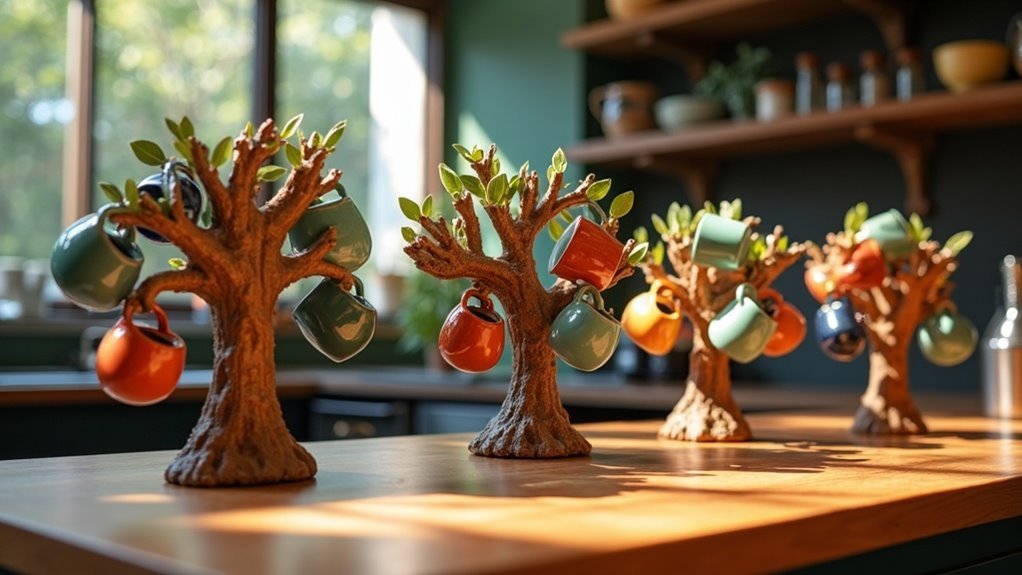Saudi Arabian coffee, known as qahwa, is not just a beverage but a symbol of hospitality and community. Originating in Yemen, it is traditionally brewed with spices like cardamom, adding depth to its rich flavor profile. Served in small finjān cups, this light roast coffee highlights its natural bitterness, making each sip a unique experience. The customs surrounding its preparation and serving emphasize respect and connection among individuals. Enjoying qahwa fosters social interactions and mindfulness, allowing you to appreciate not only the coffee itself but also the cultural significance and potential health benefits it offers. Embracing this tradition can deepen your understanding of coffee as an integral part of social and cultural life.
Key Takeaways
- Saudi Arabian coffee, known as “qahwa,” originated in Yemen and is steeped in cultural significance and hospitality traditions.
- It is typically brewed using a dallah, often infused with spices like cardamom and saffron for added flavor complexity.
- The coffee is lightly roasted and served unsweetened in small finjān cups, which enhances its natural bitterness and rich aroma.
- Serving etiquette prioritizes respect, with cups filled only one-fourth full to encourage conversation and connection among guests.
- Qahwa also offers health benefits, being rich in antioxidants, aiding digestion, and promoting mindfulness and social interactions.
Etymology and History of Saudi Arabian Coffee
When you explore the world of Saudi Arabian coffee, or “qahwa,” you discover a rich tapestry woven through centuries of tradition and culture. Its etymology reveals deep roots, with the term “qahwa” deriving from the Arabic word for coffee, reflecting its significance in daily life.
The history of qahwa traces back to 15th-century Yemen, where it became essential for Sufi practices during nighttime prayers. By the 17th century, coffee houses, or “qahveh khaneh,” emerged as cultural hubs, reinforcing social bonds.
Each sip of qahwa honors this legacy, embodying hospitality and connection within the vibrant Saudi cultural landscape. This exploration of qahwa not only highlights its historical importance but also celebrates its role in contemporary coffee culture.
Preparation Methods and Variations
When you prepare Saudi Arabian coffee, or qahwa, you’ll notice that the brewing techniques play a crucial role in its unique flavor profile.
Using a dallah, you can infuse the coffee with spices like cardamom and saffron, creating a rich and aromatic experience.
Each sip reflects the careful tradition behind this cherished beverage, inviting you to explore its depths and variations in the world of coffee.
Brewing Techniques Overview
Brewing Saudi Arabian coffee, or “qahwa,” reveals a rich tapestry of flavor and tradition that captivates the senses. This unique brewing method features lightly roasted coffee, often infused with cardamom, resulting in a delightful aroma. Using a dallah, you’ll boil the coffee, mixing it with cardamom, and serve it unsweetened in small finjān cups. A higher coffee-to-water ratio enhances its robust taste. After boiling, strain the coffee to remove grounds and enjoy it alongside dates or sweets. Explore the variations below:
| Brewing Method | Key Ingredients | Flavor Notes |
|---|---|---|
| Traditional | Lightly roasted coffee | Spiced, aromatic |
| Cardamom infusion | Coffee with cardamom | Warm, inviting |
| Spiced variations | Coffee with saffron/cloves | Unique, regional |
Discover the world of coffee through these enchanting brewing techniques, each offering a unique experience and flavor profile that showcases the deep-rooted traditions of coffee culture.
Flavor Profiles Explained
Exploring the flavor profiles of Saudi Arabian coffee is like embarking on a sensory journey through its rich cultural landscape. The beans are lightly roasted, showcasing their natural qualities and delivering a mild yet vibrant flavor profile.
Traditional preparation involves boiling the coffee with cardamom, infusing it with aromatic complexity that captivates the senses. You’ll often find smaller serving sizes, allowing for concentrated enjoyment without overwhelming your palate.
Variations may include a hint of saffron, creating an exotic twist that reflects regional preferences. Each cup offers a unique taste experience, inviting you to savor the essence of Saudi hospitality and the artistry of coffee.
Cultural Significance and Serving Etiquette
When you step into a Saudi home, the aroma of freshly brewed qahwa invites you into a world where coffee culture thrives.
The careful rituals of serving coffee reflect deep cultural respect, as cups are offered with intention and etiquette is honored.
Understanding these practices not only enhances your appreciation of coffee but also strengthens social bonds in this rich tradition.
Hospitality and Generosity
Saudi Arabian coffee, known as “qahwa,” is a vibrant symbol of hospitality and generosity, intricately woven into the fabric of social interactions.
When you partake in qahwa, you engage in a rich tradition that embodies warmth and respect. Key aspects of this cultural significance include:
- Serving the eldest or highest-ranking guest first, showcasing honor and reverence
- Pouring coffee from the dallah with your left hand while holding cups in your right, a gesture of grace
- Presenting cups filled only one-fourth full, allowing for comfortable sipping and encouraging conversation
- Accompanying coffee with dates or sweets to enhance the experience and add sweetness to the moment
In Saudi culture, sharing qahwa is an essential gesture of friendship, making it not just a drink, but a bridge of connection among individuals.
Serving Rituals and Etiquette
In the rich tapestry of Saudi culture, the serving rituals and etiquette surrounding qahwa (Arabic coffee) stand out as essential expressions of respect and community. When serving coffee, it is customary to offer the eldest guest first, emphasizing the importance of hospitality. The server traditionally holds the dallah (coffee pot) in the left hand while pouring with the right, symbolizing a blend of tradition and respect. Cups are filled only a quarter full, encouraging guests to savor the experience, and they signal they’ve had enough by shaking the cup. Refusing coffee without a valid reason can be perceived as impolite, reinforcing its significance in fostering community bonds.
| Serving Aspect | Description | Cultural Significance |
|---|---|---|
| Cup Size | Filled one-fourth full | Encourages sipping |
| Serving Order | Eldest guest first | Demonstrates respect |
| Refusal Etiquette | Impolite without reason | Enhances hospitality |
| Signaling Enough | Shake the cup | Communicates comfort |
| Accompaniments | Dates served with coffee | Balances flavors |
Social Interaction Importance
While enjoying a cup of qahwa, you may not realize the depth of social interaction it fosters within Saudi culture. This cherished beverage embodies hospitality and strengthens community bonds through its unique serving traditions.
Key aspects include:
- Coffee served in small cups to emphasize modesty
- The eldest or highest-ranking guest receives their cup first, reflecting respect
- Guests take only a few sips, signaling their satisfaction by shaking the cup
- Phrases like “tafaddal” enhance politeness and warmth
These rituals not only highlight cultural values but also create meaningful connections, making every cup of coffee a celebration of togetherness.
This website is dedicated to exploring the rich world of coffee and its significance in fostering social ties and cultural appreciation.
Flavor Profile and Tasting Notes
Qahwa offers an enchanting flavor profile that distinguishes it from other coffee varieties. With a lighter roast, it presents a bright, smooth taste complemented by a mildly bitter finish.
The aromatic notes of spices, particularly cardamom, infuse the brew with warmth and depth, while earthy flavors and hints of dried fruit emerge from its unique dry-processing method.
Typically served in smaller portions of 60-90 ml, qahwa allows you to savor its robust essence without being overwhelmed. Unlike sweeter Arabic coffees, it’s enjoyed unsweetened, enabling you to fully appreciate the natural flavors and spices that make this coffee truly special.
Health Benefits of Saudi Arabian Coffee
When you savor a cup of Saudi Arabian coffee, you’re not just enjoying a delightful beverage; you’re also unlocking a variety of health benefits that can enhance your overall well-being.
Savoring Saudi Arabian coffee offers not just flavor, but also a wealth of health benefits for your well-being.
This aromatic drink is low in calories and rich in antioxidants, supporting your health in multiple ways. Here are some key benefits:
- Boosts cognitive function and alertness due to its caffeine content
- Contains cardamom, which provides anti-inflammatory properties
- Aids digestion and promotes a healthy metabolism
- Supports weight management by enhancing metabolic rates
Enjoy these health benefits with every sip of your rich and flavorful Saudi coffee!
Differences Between Saudi and Other Arabic Coffees
While many Arabic coffees possess a rich heritage, Saudi Arabian coffee, known as “qahwa,” distinguishes itself with unique characteristics and preparation methods. Typically lightly roasted, Saudi coffee enhances its caffeine content and allows spices like cardamom to take center stage. Unlike sweeter Arabic varieties, it is served unsweetened, emphasizing its natural bitterness. The serving sizes are smaller, usually around 60-90 ml, offering a concentrated experience. The following table outlines key differences:
| Feature | Saudi Coffee |
|---|---|
| Roast Level | Lightly Roasted |
| Sweetness | Unsweetened |
| Spice Addition | Cardamom (and saffron) |
| Serving Size | 60-90 ml |
| Cultural Etiquette | First cup served to elder |
Coffee-Related Traditions and Customs
Coffee in Saudi Arabia is more than just a beverage; it embodies the essence of hospitality and cultural identity. When you experience the serving of qahwa, you engage in a time-honored tradition that reflects respect and generosity.
Coffee in Saudi Arabia transcends mere enjoyment; it symbolizes hospitality and cultural heritage, inviting you into a cherished tradition of respect and generosity.
Here are some key customs:
- Qahwa is lightly roasted and infused with cardamom, offering a unique flavor profile that’s distinctive to the region.
- The eldest guest is served first, showcasing the importance of respect and honoring seniority within the community.
- Dates are traditionally served alongside the coffee, providing a sweet balance to its natural bitterness.
- During special occasions like Eid, elaborate rituals enhance the coffee experience, underscoring its cultural significance and the importance of sharing moments with loved ones.
Immerse yourself in these rich traditions, and you’ll gain a deeper understanding of Saudi hospitality and its profound connection to coffee culture.








